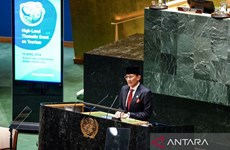WB: East Asian economies rebound from downturn
The WB on
Nov. 3 launched its East Asia and Pacific Update, saying East Asia’s
rebound from the economic downturn has been surprisingly swift and very
welcome.
The Washington-based World Bank (WB) on
Nov. 3 launched its East Asia and Pacific Update, saying East Asia’s
rebound from the economic downturn has been surprisingly swift and very
welcome.
A vigorous and timely fiscal and monetary stimulus in most countries in East Asia, led by China and the Republic of Korea (RoK), along with decisive measures in developed economies to prevent a financial meltdown, have stopped the decline in activity and set in motion the regional rebound, it said in the report.
”These factors have led us to revise our projection for real GDP growth in developing East Asia up by 1.3 percentage points since the previous forecast in April,” the WB said. All in all, real GDP growth is set to slow to 6.7 percent in 2009 from 8 percent in 2008.
However, the rebound has yet to become a recovery, the WB said, adding that is why the authorities in the region are mindful of the risks of a premature withdrawal of stimulus, given the large output gaps and concerns that developed countries are converging to a slower-growth equilibrium.
According to the WB, developments in East Asia remain strongly influenced by China.
”Take China out of the equation, and the rest of the region is recovering with less vigor,” it said.
For 2009 as a whole, output is projected to contract in Cambodia, Malaysia and Thailand and barely grow in Mongolia and some of the Pacific islands. Even with solid growth in Indonesia and Vietnam, developing East Asia excluding China is projected to grow more slowly in 2009 than South Asia, the Middle East and North Africa, and only modestly faster than Sub-Saharan Africa, it said.
The WB also said that the crisis has prompted countries in the region to rethink their development strategies. For most, the choice between growth driven by exports, on the one hand, and growth driven by domestic demand, on the other, is a false one.
”Countries need to resist protectionism, remain open and become more, not less, integrated into the global economy to continue to reap the benefits of global knowledge, technologies and innovation,” it said.
The latest WB report themed “Transforming the Rebound into Recovery” covers developing economies, including China, Indonesia, Malaysia, the Philippines, Thailand, Cambodian, Laos, Mongolia, Papua New Guinea, East Timor, Vietnam, island economies in the Pacific, and newly industrialised economies./.
A vigorous and timely fiscal and monetary stimulus in most countries in East Asia, led by China and the Republic of Korea (RoK), along with decisive measures in developed economies to prevent a financial meltdown, have stopped the decline in activity and set in motion the regional rebound, it said in the report.
”These factors have led us to revise our projection for real GDP growth in developing East Asia up by 1.3 percentage points since the previous forecast in April,” the WB said. All in all, real GDP growth is set to slow to 6.7 percent in 2009 from 8 percent in 2008.
However, the rebound has yet to become a recovery, the WB said, adding that is why the authorities in the region are mindful of the risks of a premature withdrawal of stimulus, given the large output gaps and concerns that developed countries are converging to a slower-growth equilibrium.
According to the WB, developments in East Asia remain strongly influenced by China.
”Take China out of the equation, and the rest of the region is recovering with less vigor,” it said.
For 2009 as a whole, output is projected to contract in Cambodia, Malaysia and Thailand and barely grow in Mongolia and some of the Pacific islands. Even with solid growth in Indonesia and Vietnam, developing East Asia excluding China is projected to grow more slowly in 2009 than South Asia, the Middle East and North Africa, and only modestly faster than Sub-Saharan Africa, it said.
The WB also said that the crisis has prompted countries in the region to rethink their development strategies. For most, the choice between growth driven by exports, on the one hand, and growth driven by domestic demand, on the other, is a false one.
”Countries need to resist protectionism, remain open and become more, not less, integrated into the global economy to continue to reap the benefits of global knowledge, technologies and innovation,” it said.
The latest WB report themed “Transforming the Rebound into Recovery” covers developing economies, including China, Indonesia, Malaysia, the Philippines, Thailand, Cambodian, Laos, Mongolia, Papua New Guinea, East Timor, Vietnam, island economies in the Pacific, and newly industrialised economies./.













